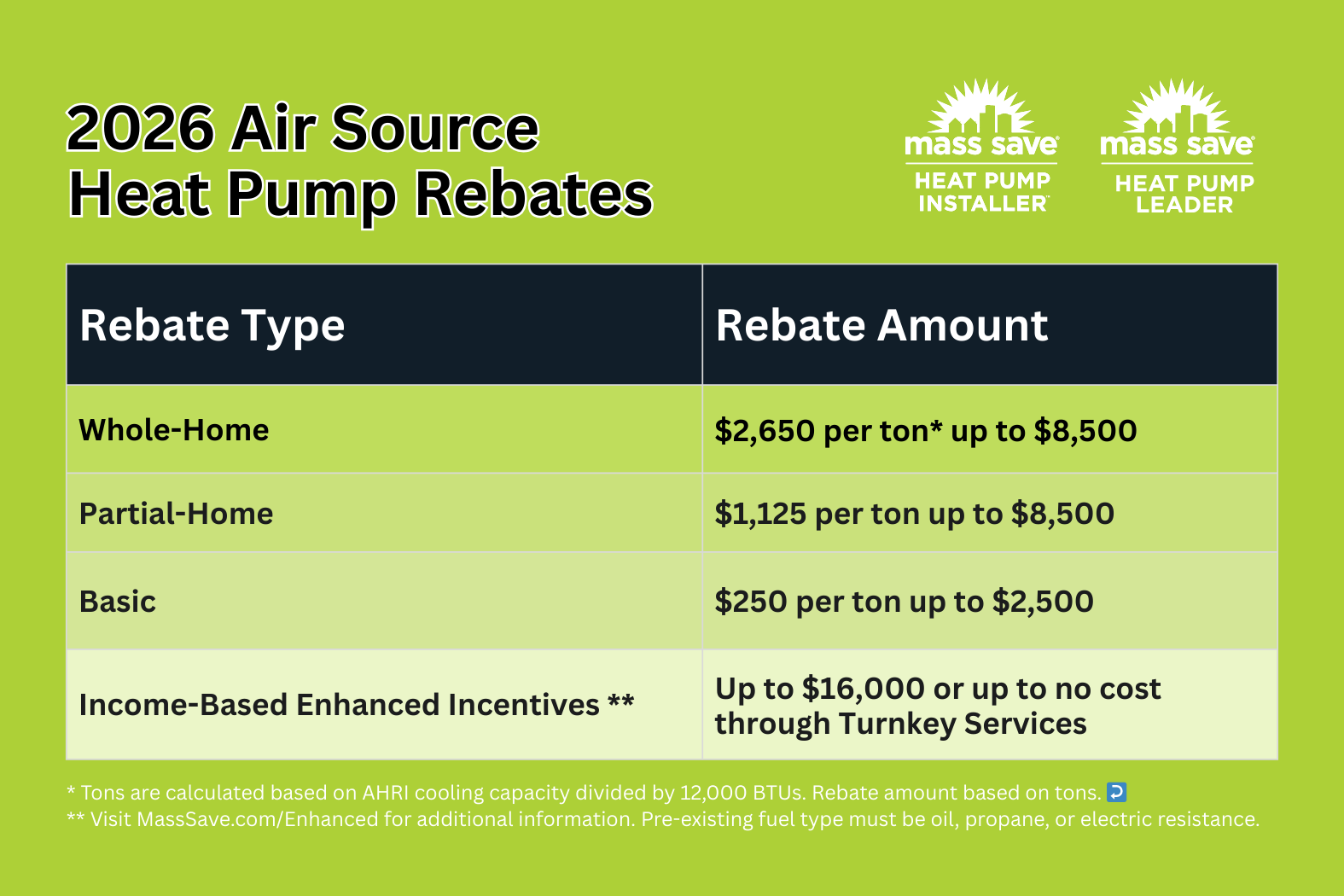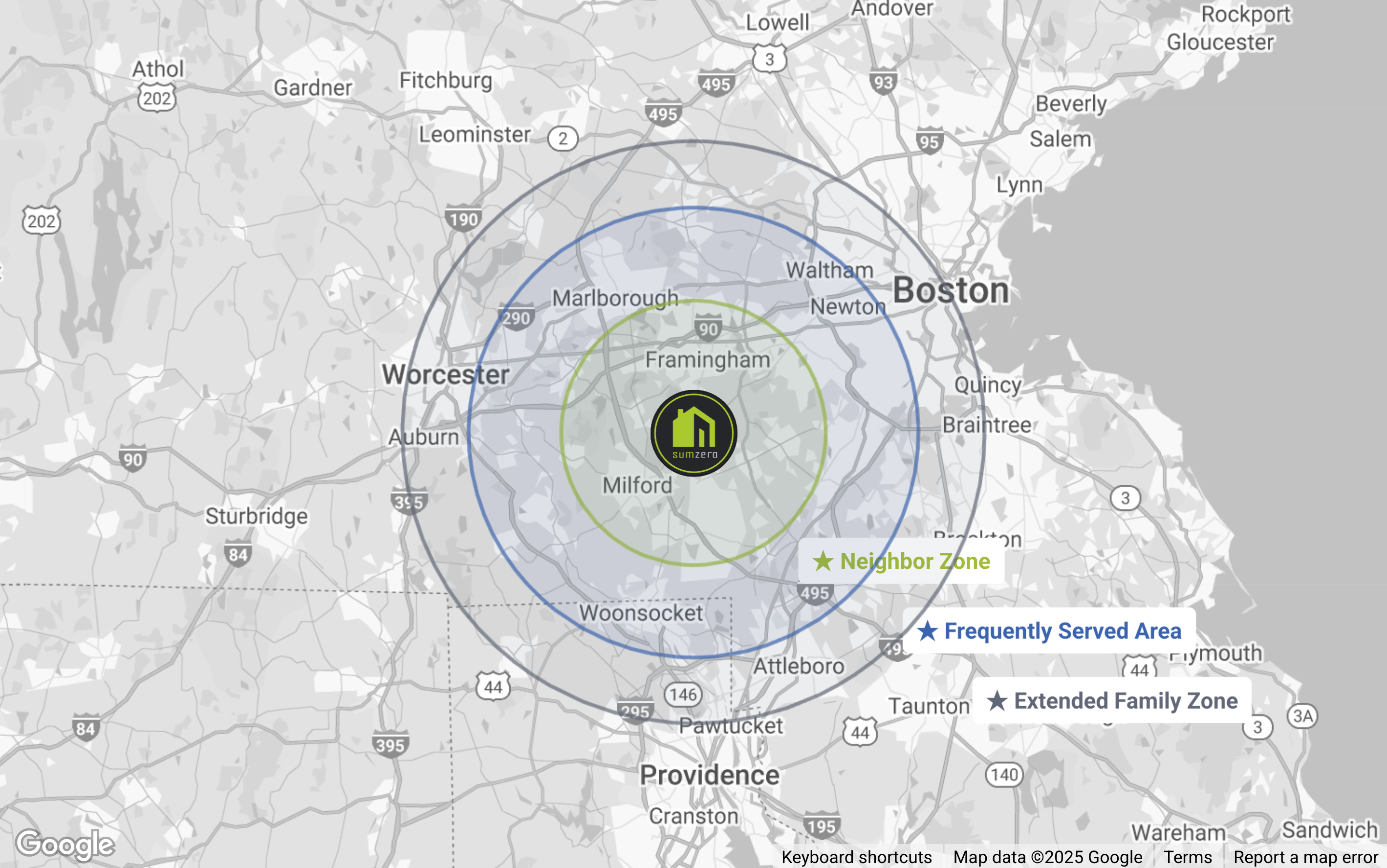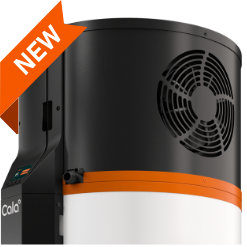2026 Harvard MA Heat Pump Rebates Now Up to $8,500 | Rebates & Tax Credits | Harvard, MA
2026 Harvard MA heat pump rebates provide up to $8,500 in incentives for qualifying installations through the Mass Save® program. With rebate amounts reduced from 2025 and new eligibility rules in effect, Harvard homeowners should act quickly to lock in savings before incentives decrease further.

Heat Pumps in Harvard, MA: Maximizing 2026 Rebates Before They Shrink Further
Harvard, Massachusetts has always been ahead of the curve when it comes to energy efficiency and environmental responsibility. In towns like ours—where historic homes meet modern needs—heating and cooling solutions must balance tradition and innovation. With rising energy costs and a strong emphasis on Massachusetts’ clean energy roadmap, many homeowners in Harvard are turning to heat pumps as their go-to HVAC upgrade.
But in 2026, the landscape is shifting. While the Mass Save® program still offers generous rebates for heat pump installations, the incentives are no longer as high as they were in 2025. If you're considering making the switch, now is the time to understand your options, take action, and secure the highest savings possible.
“Heat pumps remain among the most effective pathways to electrification in Massachusetts—and in Harvard, MA specifically, they're becoming not just a smart upgrade, but an essential one.”
2026 Mass Save® Heat Pump Rebates: What Homeowners in Harvard Need to Know
What Changed from 2025 to 2026
As of 2026, rebate amounts for heat pumps through the Mass Save® program have been reduced by $1,500 compared to 2025. This change reflects the phased drawdown of incentive programs across Massachusetts as early adoption goals begin to meet critical mass.
- 2026 Whole-Home rebate: $2,650 per ton, up to $8,500
- 2026 Partial-Home rebate: $1,125 per ton, up to $8,500
- 2026 Basic rebate: $250 per ton, capped at $2,500
- Income-Based Enhanced Incentives: Up to $16,000 or installation at no cost, still available for qualifying households through Turnkey Services
For homeowners in Harvard, many of whom live in colonial or Cape-style homes that often have mixed heating systems, the differentiation between Whole-Home and Partial-Home rebates is crucial to understand. It’s no longer just about installing a heat pump—it’s about how you use it and how much of your home it covers.
Incentives Are Shrinking—Here’s Why Timing Matters
With a $1,500 drop in rebates from last year, it’s clear: incentives aren’t increasing over time—they're decreasing. Early adopters in Harvard who acted in 2025 received higher rebates, but you can still lock in substantial savings if you act soon in 2026.
In addition, the Federal tax credit that previously supplemented state incentives is no longer available in 2026. That makes local rebates from programs like Mass Save® and utility-based discounts even more important.
“Rebates matter more now than ever—because once they’re gone, they’re gone for good. The sooner you act, the more you’ll save.”
Key Requirements for 2026 Heat Pump Rebate Eligibility
If you're planning to take advantage of the rebates in 2026, it’s essential to meet all new Mass Save® eligibility criteria, especially updates related to equipment and refrigerants.
Shift to Low-GWP Refrigerants
Starting in 2026, your heat pump system must use a low Global Warming Potential (GWP) refrigerant to qualify for rebates. That means older systems that rely on R-410A refrigerants are no longer eligible under Mass Save® guidelines. Systems must now use refrigerants like R-32, which align with Massachusetts’ climate and air quality goals.
This change ensures long-term environmental benefits but also narrows the types of systems that qualify. Homeowners should work closely with qualified contractors—like those at SumZero Energy Systems—who understand the latest equipment standards.
Energy Efficiency Standards Still Apply
Beyond refrigerants, the usual energy efficiency requirements still stand. Your system must meet:
- Minimum SEER (Seasonal Energy Efficiency Ratio)
- HSPF (Heating Seasonal Performance Factor)
- Installation by a Mass Save-approved contractor
- Use of integrated controls for partial-home systems (when combining with existing boilers or furnaces)
Choosing the Right Rebate Model: Whole-Home vs. Partial-Home vs. Basic
Whole-Home Rebates: Full Electrification for Maximum Saving
The Whole-Home rebate of $2,650 per ton (up to $8,500) is ideal for Harvard residents who want to fully transition from fossil fuel heating and cooling to a 100% electric solution. To qualify, the heat pump must serve the entire home year-round, eliminating the need for a backup boiler or furnace.
Benefits include:
- Maximum Mass Save® rebate option
- Simplified HVAC system management
- Highest impact on carbon emissions reduction
- Long-term energy bill control, especially with reduced-rate programs from local utilities
If your current system is outdated or based on oil heating—still common in older Harvard homes—this option provides a true modernization path.
Partial-Home Rebates: A Flexible Middle Ground
For homes where a full switch isn’t feasible, the Partial-Home rebate offers $1,125 per ton, up to $8,500. These systems must provide heating and cooling for a significant portion of the house but allow integration with an existing conventional system.
This is a popular option for:
- Multi-zone or multi-story homes with different thermal needs
- Historic homes in Harvard where structural constraints limit ducting
- Homeowners who want to upgrade room-by-room over time
Note: Partial-Home systems must be paired with integrated controls to qualify for this rebate level.
“Harvard homes are often beautifully unique—but that means HVAC solutions need to be just as unique. Partial upgrades can offer the flexibility modern homeowners need.”
Basic Rebates: Entry-Level Savings for Smaller Upgrades
Just planning a mini-split installation for a home office AC upgrade? The Basic rebate of $250 per ton (up to $2,500) provides an accessible starting point. While less generous, it still rewards efficient choices and supports your transition to electrified HVAC systems.
Ideal for:
- Single-zone ductless cooling systems
- Room-specific retrofits in older homes
- Budget-conscious upgrades that build toward full electrification
Enhanced Rebates for Income-Eligible Households in Harvard
Under Mass Save®’s Income-Eligible Enhanced Offers, qualifying households in Harvard can receive up to $16,000 in heat pump incentives—or even full system installation at no cost—by applying through Turnkey Services in collaboration with participating utility providers.
To qualify, households must meet income thresholds, generally aligned with 60% to 80% of area median income (AMI). This makes electrification more accessible for families experiencing energy burden in colder months.
These income-qualified rebates are some of the last of their kind, as statewide funding adjusts over coming years. If you qualify, leveraging these incentives now could mean the difference between a partial and full system overhaul.
Harvard’s Energy Landscape: Why Heat Pumps Make Sense in 2026
Local Climate Requires Year-Round Comfort
Harvard, MA experiences a wide range of seasonal temperatures—freezing winters and warm, humid summers. Traditional HVAC systems often don’t perform efficiently through both extremes. Heat pumps, on the other hand, are now capable of functioning at sub-zero temperatures thanks to cold-climate technology endorsed by Mass Save®.
Modern cold-climate heat pumps offer:
- High efficiency in temperatures as low as -5°F
- Quiet operation; ideal for Harvard’s peaceful residential zones
- Air filtration benefits for allergy-prone residents
Common Home Types in Harvard Are Excellent Matches for Heat Pump Retrofits
From pre-1900 historic homes near the town center to 1980s colonials and newer developments along Route 111 and Still River Road, Harvard’s homes vary in age, insulation quality, and square footage. Fortunately, air-source heat pumps are flexible enough to serve most architectural types, integrating with existing ductwork or operating ductlessly.
Choosing zoned mini-split systems can offer room-by-room control, while full ducted systems can reinforce the energy efficiency of newer builds.
Cost-Saving Programs Beyond Rebates: Utility Provider Winter Rate Discounts
In addition to state-level rebates, many residents in Harvard qualify for winter electricity rate reductions offered by local utility providers when they switch to electric heat sources like heat pumps.
To access these lower rates, your system must be:
- Metered correctly as a primary heating source
- Installed by a contractor who registers your system with the utility
- Verified for seasonal use by the program’s criteria
These rate programs combine with Mass Save® rebates to significantly lower annual operating costs, especially during January and February when heating bills would normally spike.
Ready to Make the Switch Before Incentives Shrink More?
2026 is a pivotal year for home electrification in Harvard. Rebates are still generous—but the window is narrowing. With updated refrigerant requirements, reduced incentive totals, and no federal tax credits, homeowners in Harvard, MA need to act strategically to maximize rebate potential while still available.
Knowledge is power, and when it comes to upgrading your HVAC system in alignment with Massachusetts’ clean energy goals, being informed saves you money.
For further details on specific qualifying equipment and updated metrics, you can reference the official Mass Save® Residential Air Source Heat Pump Requirements page.
By choosing qualified, forward-thinking installers who understand Harvard’s homes and the evolving rebate ecosystem, you can get the job done right—on time, on budget, and with confidence that it will meet future standards as well.
What Local Homeowners Are Saying
See how SumZero has helped local homeowners stay comfortable year-round with energy-efficient heat pump solutions.
Not Sure Where to Start? We’ll Guide You
Let our experts design the right heating and cooling solution—customized for your comfort, your layout, and your energy goals. No pressure. Just clarity.
Request FREE ESTIMATE












